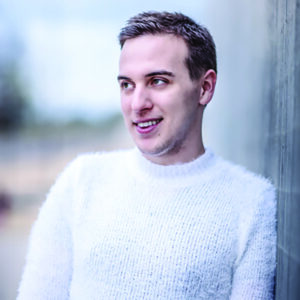by Nick Lingerfelt | photo by John McCommon, JSCC Director of PR
While the world marches in the direction of equality for all, some young LGBTQ people in smaller towns still have not been able to join those ranks. But for students at Jackson State Community College (JSCC) in Jackson, Tenn., many of whom are from rural communities, an inclusive and safe space is thriving.
Kyle Peppers, presidentof the JSCC Human Rights Club, said he became involved because just knowing the club existed made him feel much better and safer.
“The difference between high schools in the community (and) Jackson State is incredible,” Peppers said. “It’s very progressive, actually.”
Peppers said the organization aims to raise awareness and visibility of their cause and the fact that their club exists.
“We want more people to find out about it,” he said.
“Our main goal is to support the achievement of equality for all. We want to promote a safe place for students, free from discrimination.”
Peppers said the club has opened people’s minds to the idea of LGBTQ people and other minorities being around.
“I think it’s so important to see that we’re doing something, to see that we’re working together,” Peppers said. “On campus specifically, knowing there’s an organization fighting for human rights, it definitely makes discriminatory people think twice before they try to say something (disparaging) to us. It really helps change people’s opinion, in my mind.”
Peppers said people who join the club gain a sense of community and become more comfortable with who they are because they are around people like them.
“I think it lights a fire under people to try to change people’s minds, and I think that when somebody new comes into the club, and they start opening up little by little, and they start learning things about human rights, it really gives them the passion to fight for it as well,” Peppers said.
Liz Mayo, an English professor at JSCC and the group’s faculty advisor, said Jackson State serves 14 surrounding counties, so some students may be coming from communities that are not welcoming of LGBT+ persons.
“We have a lot of students coming from very rural places, very small towns, and they’ve all come saying the same thing,” Mayo said. “Middle school and high school were total hell for them, and they feel happy that at least at Jackson State, there’s this little bubble where they’re more respected and accepted.”
Mayo said students often come to her to share their experiences of discrimination.
“In the last week, I’ve had three students come to me in tears and say that their parents have called them things like ‘stupid faggot,’ and it breaks me down every time,” Mayo said. “I can’t imagine saying that to my child. For me, working with these students has been a real gift because I want to be able to look at them in the face and say, ‘You’re not this thing that people keep saying to you. You are perfect as you are. You don’t need to change.’ I think some of them have never had anybody say that to them to their faces in their lives.”
Mayo said the students who have shared their experiences of discrimination with her keep her motivated to help.
“Those are the students that I think about over the years,” Mayo said. “I’ve watched them grow up. I watched them go on to grad school. I’ve watched them travel the world and become somebody. I like to think that our club gave them a special place while they were at Jackson State.”
For more information, email lmayo6@jscc.edu.



